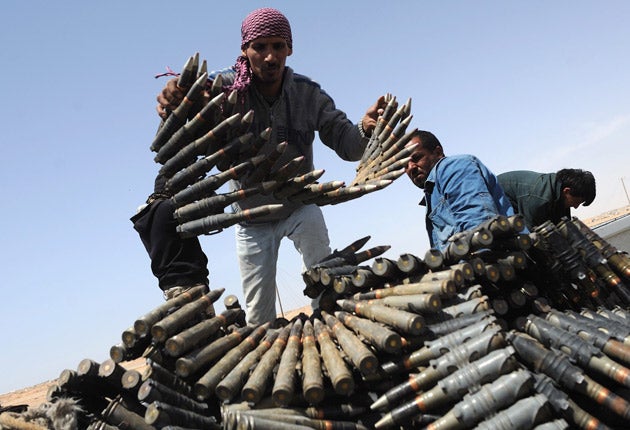West steps up Libyan presence as France and Italy send army teams

Your support helps us to tell the story
From reproductive rights to climate change to Big Tech, The Independent is on the ground when the story is developing. Whether it's investigating the financials of Elon Musk's pro-Trump PAC or producing our latest documentary, 'The A Word', which shines a light on the American women fighting for reproductive rights, we know how important it is to parse out the facts from the messaging.
At such a critical moment in US history, we need reporters on the ground. Your donation allows us to keep sending journalists to speak to both sides of the story.
The Independent is trusted by Americans across the entire political spectrum. And unlike many other quality news outlets, we choose not to lock Americans out of our reporting and analysis with paywalls. We believe quality journalism should be available to everyone, paid for by those who can afford it.
Your support makes all the difference.Two more Western powers said yesterday they were joining Britain in sending military advisers to help rebel forces in Libya. But media reports suggested that France and Italy had, in fact, deployed a handful of officers to the rebel headquarters in Benghazi some time ago. The announcements by Paris and Rome probably amounted to an admission – and an extension – of what was already happening.
In both cases, the countries said that their officers would play a purely advisory role. Like Britain, they insisted that there was no question of their soldiers joining in the fighting. The Italian Defence Minister, Ignazio La Russa, said after meeting his British counterpart, Liam Fox, that 10 Italian instructors would be going to Libya. French officials talked of "less than 10" officers, probably from special forces.
President Nicolas Sarkozy promised after meeting the Libyan rebel leader Mustafa Abdel Jalil in Paris yesterday that Nato would step up its air strikes on heavy weaponry belonging to Muammar Gaddafi. "We are going to intensify the attacks, in response to a request from the National Transition Council," the Elysée Palace said. "The President told them: 'We will help you.'"
After the meeting, Mr Abdel Jalil said he had invited President Sarkozy to visit Benghazi in the near future.
The French Budget Minister François Baroin said there would be a "small number of liaison officers in Benghazi" to help the rebels "organise the protection of civilian populations".
There was no question, he said, of France sending troops to fight in Libya or seeking a new UN Security Council resolution to make this possible. Mr Baroin declined to comment on French media reports which suggested that the French military advisers had already been in Libya for some time.
However, the Elysée Palace appeared to confirm these reports, talking of "a small number of military officers working alongside our diplomatic representative in Benghazi".
In an interview with the BBC yesterday, Mr Gaddafi's Foreign Minister, Abdul Ati al-Obeidi, condemned Britain's announcement that it was sending military advisers. He said that this would "only prolong the fighting".
Mr Obeidi said his government was ready to hold free elections if the rebels and Nato agreed a ceasefire.
The challenges ahead
Command and control
General Abdel-Fatah Younes is the commander of the rebel forces. Or is he? General Khalifa Heftar thinks he is in charge: "I control everybody, the rebels and the regular army forces. I am the field commander and Younes is the chief-of-staff. My job is to lead the fighting, his job is to support me in the field." General Younes reposts: "Khalifa Heftar was dismissed from his post." There is also an opposition Defence Minister, Omar al-Hariri, but neither general takes much notice of him.
Battlefield equipment
The rebels say they should be given advanced weaponry. But doing so without training them, which we are told the Nato advisers will not do, would be futile. The rebels have wasted at least four times the ordnance by shooting into the air than they have fired in anger. They have crashed their few tanks into each other and shot down their own air force of two planes.
The rebels
The Shabaab ("the lads") are volunteer fighters who rock up to the eastern front line, often without weaponry or any tactical nous. They advance, mostly in pick-up trucks, then carry out a stampeding retreat at the first sound of gunfire. They very seldom accept orders from the former Libyan forces personnel in the rebel ranks.
Training
Almost two months since the revolution, and despite countless reverses in the field, training remains a ramshackle affair and an issue in which Western help would be invaluable. The chief trainer, Fawzi Bukatef, has no military background. He is a petroleum engineer who cheerfully admits that he only properly held a gun six weeks ago.
Kim Sengupta
Join our commenting forum
Join thought-provoking conversations, follow other Independent readers and see their replies
Comments